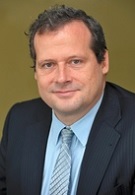Fourteen months after the FDA rejected the new antipsychotic cariprazine, the developers say they have gathered together a new batch of late-stage data to demonstrate its effectiveness for schizophrenia, but the statement has done little to dispel the lingering doubts about this one-time blockbuster hopeful.
The newly-created Big Pharma Actavis ($ACT), which bagged cariprazine with its Forest Labs merger, and its partner Gedeon Richter, say they recruited 101 patients for the small Phase III trial, which tracked relapses on doses ranging from 3 to 9 mg per day. Investigators reported that the drug arm suffered a 24.8% relapse rate, compared to 47.5% in the placebo arm.
ISI's Umer Raffat, though, noted this morning that it is hard to draw any conclusions from the limited top-line data that was on display today. The study "may have been aimed at addressing FDA request for new clinical data to define an 'optimal dosing regimen'--perhaps especially as it relates to minimizing safety issues," he wrote in a note to investors.
The FDA stiff-armed Richter and Forest in the fall of 2013, though Richter insisted then that it could be able to meet the agency's demands swiftly. Other analysts like Leerink's Seamus Fernandez, though, speculated at the time that the companies were probably looking at something like a 2-year delay, a forecast that looks far more accurate today.
Richter has been consistently bullish about this drug, insisting that it was a blockbuster in the making that could earn $2 billion a year at the peak. And it was considered a top Phase III drug at Forest as well. Raffat notes this morning that the consensus view is that the developers could expect to earn about $200 million a year from the therapy, 10 cents on the dollar once expected by the developers.
 |
| Istvan Greiner |
"We are encouraged by the positive top line results shown in this study, which are considered as a further milestone in the process of making this promising treatment option available for patients suffering from schizophrenia," said Dr. Istvan Greiner, research director of Gedeon Richter, in a statement.
- here's the release